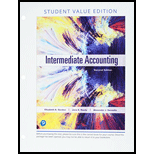
Determining When to Recognize Revenue. Megrew Building Company is developing a multi-unit residential building complex. Kit Collier enters into a binding sales contract with Megrew for a specified unit that is under construction. Each unit is of a similar size and has a similar floor plan, but other characteristics of the units, such as the location of the unit within the complex, are different.
Scenario 1. Collier pays a deposit of $10,000 that is refundable only if Megrew fails to complete construction of the unit in accordance with the contract. The remainder of the contract price of $240,000 is payable on completion of the contract when Collier obtains physical possession of the unit. If Collier defaults on the contract before completion of the unit, Megrew has only the right to retain the deposit.
Scenario 2. Collier pays a $10,000 nonrefundable deposit upon entering into the contract and will make four progress payments during construction of the unit. The contract includes the following other terms:
- Megrew is precluded from being able to transfer the unit to another customer.
- Collier does not have the right to terminate the contract unless Megrew fails to perform as promised.
- If Collier defaults on its obligations by failing to make the promised progress payments. Megrew would have a right to all of the consideration promised in the contract if it completes the construction of the unit. (The courts have previously upheld similar rights that entitle developers to require the customer to perform subject to the entity meeting its obligations under the contract.)
Scenario 3. Use the same facts as in Scenario 2 except that in the event of Collier’s default, Megrew can either require Collier to perform as required under the contract or Megrew can cancel the contract, Keep the unit under construction, and impose a penalty on Collier.
Required
For each scenario, determine whether the performance obligation is satisfied over time or at a point in time.
Want to see the full answer?
Check out a sample textbook solution
Chapter 8 Solutions
Intermediate Accounting, Student Value Edition Plus MyLab Accounting with Pearson eText -- Access Card Package (2nd Edition)
- General accountingarrow_forwardCan you explain the correct methodology to solve this general accounting problem?arrow_forwardHalle Manufacturing has an overhead application rate of 125% and allocates overhead based on direct materials. During the current period, direct labor is $78,000, and direct materials used are $112,000. Determine the amount of overhead Halle Manufacturing should record in the current period. a. $78,000 b. $97,500 c. $112,000 d. $140,000 e. $190,000arrow_forward
- Daley Industries wishes to develop a single predetermined overhead rate. The company's expected annual fixed overhead is $420,000, and its variable overhead cost per machine hour is $3.25. The company's relevant range is from 200,000 to 650,000 machine hours. Daley expects to operate at 520,000 machine hours for the coming year. The plant's theoretical capacity is 850,000 machine hours. The predetermined overhead rate per machine hour should be: a. $3.85 b. $4.06 c. $3.75 d. $4.25arrow_forwardAccounting question ?arrow_forwardgeneral accounting question using appropriate principles.arrow_forward
- Principles of Accounting Volume 1AccountingISBN:9781947172685Author:OpenStaxPublisher:OpenStax College
